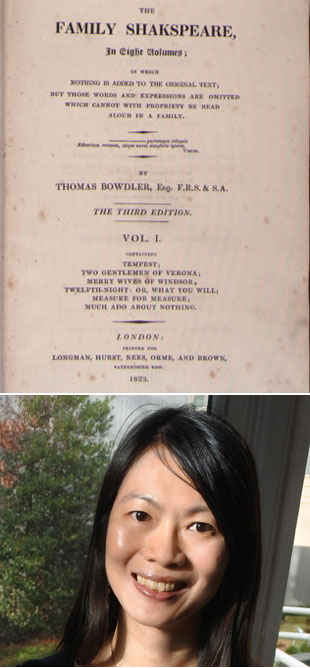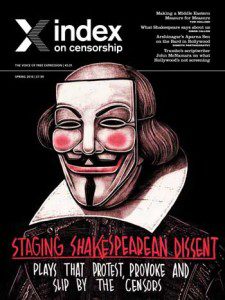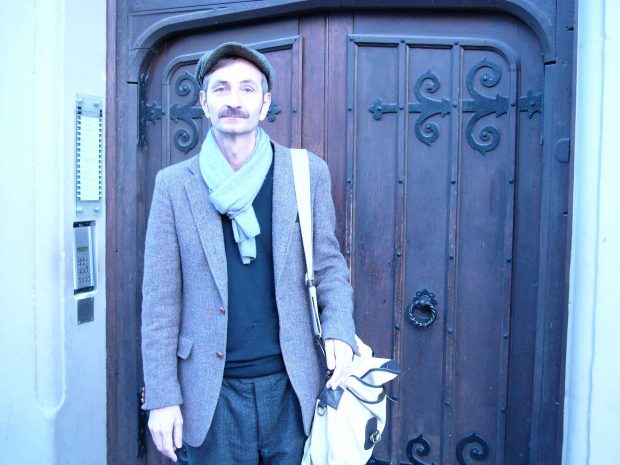2 Jun 2016 | Magazine, mobile, Volume 45.01 Spring 2016
[vc_row][vc_column][vc_column_text]

American academic Alexa Huang explores how Shakespeare’s plays were edited to make them more acceptable to Victorians.
Shakespeare has been used to divert around censorship, “sanitised” and redacted for children, young adults and school use, and even used as a form of protest all over the world. While censors have reacted differently to Shakespeare (sometimes with a blind eye), self-censorship (by directors and audiences) is part of the picture as well.
Not all censors work in the capacity of a public official. Many censors are in fact editors, writers and educators who are gatekeepers of specific forms of knowledge. Julius Caesar, for example, is often deemed one of the more appropriate plays to teach and perform in American school systems, because the themes of honor, free will and principles of the republic (as opposed to more sexually charged themes in other plays) are considered inspiring and suitable in the educational context.
The themes in such plays as Romeo and Juliet (teen exuberance and sex), The Merchant of Venice (anti-Semitism), Othello (racism and domestic violence), and Taming of the Shrew (sexism) make modern audiences uncomfortable, but they compel us to ask harder questions of our world.
While Shakespeare has been a large part of American cultural life, the “Shakespeare” that is taught and enacted in schools has often been redacted and even censored. But this is not a new phenomenon. The history of bowdlerized Shakespeare goes back to the nineteenth century. To bowdlerize a classic means to expurgate or abridge the narrative by omitting or modifying sections that are considered vulgar.
In fact, the term “bowdlerized” comes from Henrietta “Harriet” Bowdler who edited the popular, “family-friendly” anthology The Family Shakespeare (1807) which contains 24 edited plays. The anthology sanitised Shakespeare’s texts and rid them of undesirable elements such as references to Roman Catholicism, sex and more. The anthology was intended for young women readers.
Multiple ambiguities in Shakespeare are replaced by a more definitive interpretation. Ophelia no longer commits suicide in Hamlet. It is an accidental drowning. Lady Macbeth no longer curses “out, damned spot” but instead she says “Out, crimson spot!” Prostitutes are omitted, such as Doll Tearsheet in Henry IV Part 2. The “bawdy hand of the dial” (Mercutio) in Romeo and Juliet is revised as “the hand of the dial.”
Contrary to popular imagination, censorship is not a top-down operation. Instead, it is often a communal phenomenon involving both the censors and the receivers who willingly accept the Shakespeare that has been improved upon. Family Shakespeare was itself a family project. Thomas Bowdler (1754-1825) worked with his sister Henrietta Bowdler to bowdlerize or clean up the classics. The subtitle of the volume states that “nothing is added to the original text; but those words and expressions are omitted which cannot with propriety be read aloud in a family.” Shakespeare is credited as the author, though Bowdler made clear the Bard needed quite some heavy-handed editing.
Ironically, Henrietta Bowdler was herself censored. Thomas Bowdler’s name appears on the cover. It took two centuries for Henrietta to be credited for the anthology, for obviously there is no way she could have admitted that she recognised the bawdy puns in Shakespeare, much less editing them out of Shakespeare. The Bowdlers are among the better-known “censors” in the nineteenth century who editorialised the classics including Shakespeare.
When laying out her editorial principles in the preface, Bowdler does not hesitate to criticise the “bad taste of the age in which [Shakespeare] lived” and Shakespeare’s “unbridled fancy”:
The language is not always faultless. Many words and expressions occur which are of so indecent Nature as to render it highly desirable that they should be erased. But neither the vicious taste of the age nor the most brilliant effusions of wit can afford an excuse for profaneness or obscenity; and if these can be obliterated the transcendent genius of the poet would undoubtedly shine with more unclouded lustre.
She further explains her motive in The Times in 1819, emphasising that the “defects” in Shakespeare have to be corrected:
My great objects in the undertaking are to remove from the writings of Shakespeare some defects which diminish their value, and at the same time to present to the public an edition of his plays which the parent, the guardian and the instructor of youth may place without fear in the hands of his pupils, and from which the pupil may derive instruction as well as pleasure: and without incurring the danger of being hurt with any indelicacy of expression, may learn in the fate of Macbeth, that even a kingdom is dearly purchased, if virtue be the price of acquisition
While censorship carries a negative connotation in our times, The Family Shakespeare did broaden Shakespeare’s audience and readership. While American schools continue to redact Shakespeare, they also infuse Shakespeare into the American cultural life in various forms.
Alexa Huang will be participating in the Index on Censorship magazine panel at the Hay Festival.
[/vc_column_text][/vc_column][/vc_row][vc_row][vc_column][vc_custom_heading text=”From the Archives”][vc_row_inner][vc_column_inner width=”1/3″][vc_single_image image=”91322″ img_size=”213×289″ alignment=”center” onclick=”custom_link” link=”http://journals.sagepub.com/doi/pdf/10.1080/03064229008534812″][vc_custom_heading text=”Bowdler revisited: Shakespeare
” font_container=”tag:p|font_size:24|text_align:left” link=”url:http%3A%2F%2Fjournals.sagepub.com%2Fdoi%2Fpdf%2F10.1080%2F03064229008534812|||”][vc_column_text]March 1990
Artist Jane Zweig discovers books burned in Boston and looks at how Romeo and Juliet has been censored in America.[/vc_column_text][/vc_column_inner][vc_column_inner width=”1/3″][vc_single_image image=”94784″ img_size=”213×289″ alignment=”center” onclick=”custom_link” link=”http://journals.sagepub.com/doi/pdf/10.1080/03064227508532458″][vc_custom_heading text=”Censoring Shakespeare” font_container=”tag:p|font_size:24|text_align:left” link=”url:http%3A%2F%2Fjournals.sagepub.com%2Fdoi%2Fpdf%2F10.1080%2F03064227508532458|||”][vc_column_text]September 1975
A Lithuanian stage producer was dismissed from his post after sending an ‘open letter’ to Soviet authorities protesting censorship in theatre.[/vc_column_text][/vc_column_inner][vc_column_inner width=”1/3″][vc_single_image image=”93836″ img_size=”213×289″ alignment=”center” onclick=”custom_link” link=”http://journals.sagepub.com/doi/pdf/10.1080/03064228508533832″][vc_custom_heading text=”Clampdown on drama” font_container=”tag:p|font_size:24|text_align:left” link=”url:http%3A%2F%2Fjournals.sagepub.com%2Fdoi%2Fpdf%2F10.1080%2F03064228508533832|||”][vc_column_text]November 2007
Livingstone Njomo Waidhura reports on drama taught in schools and whether Shakespeare is a suitable hero for Kenya. [/vc_column_text][/vc_column_inner][/vc_row_inner][vc_separator][/vc_column][/vc_row][vc_row][vc_column width=”1/3″][vc_custom_heading text=”The unnamed” font_container=”tag:p|font_size:24|text_align:left” link=”url:%20https%3A%2F%2Fwww.indexoncensorship.org%2F2017%2F09%2Ffree-to-air%2F|||”][vc_column_text]The spring 2016 Index on Censorship magazine celebrates the 400th anniversary of William Shakespeare’s death, looking at how his plays have been used around the world to sneak past censors or take on the authorities – often without them realising. Our special report explores how different countries use different plays to tackle difficult themes.
With: Jan Fox, György Spiró, Martin Rowson[/vc_column_text][/vc_column][vc_column width=”1/3″][vc_single_image image=”86201″ img_size=”medium” alignment=”center” onclick=”custom_link” link=”https://www.indexoncensorship.org/2016/02/staging-shakespearean-dissent/”][/vc_column][vc_column width=”1/3″][vc_custom_heading text=”Subscribe” font_container=”tag:p|font_size:24|text_align:left” link=”url:https%3A%2F%2Fwww.indexoncensorship.org%2Fsubscribe%2F|||”][vc_column_text]In print, online. In your mailbox, on your iPad.
Subscription options from £18 or just £1.49 in the App Store for a digital issue.
Every subscriber helps support Index on Censorship’s projects around the world.
 SUBSCRIBE NOW[/vc_column_text][/vc_column][/vc_row]
SUBSCRIBE NOW[/vc_column_text][/vc_column][/vc_row]
22 Apr 2016 | Magazine, Volume 45.01 Spring 2016 Extras

Order your copy of the spring issue of Index on Censorship here.
Saturday 23 April marks the 400th anniversary of Shakespeare’s death. The Bard’s work has long been used to tackle difficult or controversial issues; issues that most often only received an audience due to the cloak of his respectability. To honour the occasion Index has put together a list of all things Shakespeare.
Shakespeare and his role in protest and dissent is the theme of the spring 2016 issue of Index on Censorship magazine: Staging Shakespearean Dissent; Plays That Protest, Provoke and Slip by the Censors. The issue features pieces that explore how the bard’s plays have been used to circumvent censorship and tackle difficult issues around the world; from Bollywood adaptions to Othello in apartheid-era South Africa and a ground-breaking recent performance of Romeo and Juliet between Kosovan and Serbian theatres, along with reports on theatre upsetting people in the USA, and interviews with directors around the world
Index on Censorship magazine editor Rachael Jolley introduces our Shakespeare special issue with her editorial piece, How Shakespeare’s plays smuggle protest. In this piece Jolley discusses how the work of “established” or “historic” playwrights gave actors the chance to tackle themes that would otherwise never be allowed.
Shakespeare was no stranger to censorship, from the Elizabethan to Jacobean police states. In this extract actor and theatre director Simon Callow looks at how his plays amused monarchs and dictators but also prompted their anger.
My Mate Shakespeare recasts the playwright as a brandy loving bingo addict, struggling in a war zone. The poem, which was published in the spring issue of Index on Censorship magazine, was written by poet Edin Suljic following a visit to his home country, Former Yugoslavia. The issue also features an interview with the poet, who fled to London in 1991 ahead of the country’s impending war, discussing his inspiration for the poem and his involvement with theatre group Bards Without Borders.
How well do you know Shakespeare? Take our quiz and see how much you know about the Bard and his work.
The theatre and censorship reading list is a compilation of articles from the magazine archive covering theatre censorship across the world. From the censorship of Romeo and Juliet in US high school textbooks to Janet Suzman’s controversial production of Othello in apartheid-era South Africa, to the banning of performances of Macbeth in actors’ homes in Czechoslovakia.
In an interview with magazine editor Rachael Jolley an award-winning cartoonist, Ben Jennings, discusses his design for the latest Index on Censorship magazine cover on the 400th anniversary of William Shakespeare’s death.
Hitler was a Shakespeare fan; Stalin feared Hamlet; Othello broke ground in apartheid-era South Africa; and Brazil’s current political crisis can be reflected by Julius Caesar. Across the world different Shakespearean plays have different significance and power. In our global guide to using Shakespeare to battle power some of our writers talk about some of the most controversial performances and their consequences.
Order your full-colour print copy of our Shakespeare magazine special here, or take out a digital subscription from anywhere in the world via Exact Editions (just £18* for the year). Each magazine sale helps Index on Censorship fight for free expression worldwide.
*Will be charged at local exchange rate outside the UK.
Magazines are also on sale in bookshops, including at the BFI and MagCulture in London as well as on Amazon and iTunes. MagCulture will ship anywhere in the world.
18 Apr 2016 | Magazine, mobile, Volume 45.01 Spring 2016

Poet Edin Suljic was inspired to write My Mate Shakespeare after a recent trip to his home country
My Mate Shakespeare
The first time I met Shakespeare, he looked nothing like himself, nothing like that
depiction of a poster boy with a hipster beard one comes across every so often.
No, he was tall, scrawny, flamboyant, thin-moustached and bespectacled, with large
hands into which his guitar almost disappeared as he sang perched on a low
stool, in the theatre’s green room, where we would occasionally be allowed to
sneak into as aspiring writers and actors, to join the post-press-night party.
In those days we shared many breakfasts, mainly a coffee and cigarettes, and
sometimes a boiled egg given to us by a kind cook in the theatre’s canteen.
And our fortunes took many turns …
Some claimed his work as if it was their own, they complained about too many foreigners
in his plays (As if we don’t have our own trulls – they’d say). Others even claimed he
never wrote anything, or worse, that he never existed. My mate Shakespeare …
Every so often he’d ask me if I am still writing, then say:
– Keep writing, keep writing, me duck …
But then, he ripped apart my first play.
That’s too serious boyo – he said, and inserted an innuendo into every second paragraph.
He was madly in love with this blonde, petite, round-eyed actress who was patiently
waiting for her lucky break on stage, and for him to come to her garret.
Almost addicted to bingo and drinking a lot of poor-quality brandy, he got himself into
many troubles by attacking so many kings, offending so many celebrities and ridiculing
politicians; and he wrote too many plays about deformity and cross dressing.
Even his small girlfriend turned out to be a man in disguise.
Then the war tore everything apart, and I haven’t seen him since.
The world entered into this never-ending war.
I heard the stories … He married a very different girl and they had two beautiful
children and they lived somewhere in the outskirts of the City.
He doesn’t go to the theatre anymore.
But then, like most stories about him, these too, turned out to be unreliable.
I saw him once more – in the East End. That last time I saw him, he
looked like a broken man. My friend. My indestructible friend.
Something or somebody managed to do it to him.
I suppressed a cry inside myself. What is left for the rest of us? What
will happen to us if people like him could be broken?
Then he leaned over his glass of cheap brandy and whispered
– Keep writing, keep writing, boyo …

Spring 2016 cover
Read an interview with Suljic in the latest magazine. This Saturday (April 23) marks the 400th anniversary of Shakespeare’s death. To commemorate this, the spring issue of Index on Censorship magazine is a Shakespeare and protest special, featuring pieces that explore how the bard’s plays have been used to circumvent censorship and tackle difficult issues around the world; from Bollywood adaptions to Othello in apartheid-era South Africa and a ground-breaking recent performance of Romeo and Juliet between Kosovan and Serbian theatres, along with reports on theatre upsetting people in the USA, and interviews with directors around the world. Historian Tom Holland writes about how a Middle Eastern performance of Measure for Measure would hit the spot, and playwright Elizabeth Zaza Muchemwa on how Shakespeare sneaks tricky debates into Zimbabwean culture.
Order your full-colour print copy of our Shakespeare magazine special here, or take out a digital subscription from anywhere in the world via Exact Editions (just £18* for the year). Each magazine sale helps Index on Censorship fight for free expression worldwide.
*Will be charged at local exchange rate outside the UK.
Magazines are also on sale in bookshops, including at the BFI and MagCulture in London, News from Nowhere in Liverpool and Home in Manchester; as well as on Amazon and iTunes. MagCulture will ship to anywhere in the world.
11 Apr 2016 | Magazine, Volume 45.01 Spring 2016 Extras

Kemel Aydogan’s production of A Midsummer Night’s Dream in Turkey. Credit: Mehmet Çakici
Hitler was a Shakespeare fan; Stalin feared Hamlet; Othello broke ground in apartheid-era South Africa; and Brazil’s current political crisis can be reflected by Julius Caesar. Across the world different Shakespearean plays have different significance and power. The latest issue of Index on Censorship magazine, a Shakespeare special to mark the 400th anniversary of his death, takes a global look at the playwright’s influence, explores how censors have dealt with his works and also how performances have been used to tackle subjects that might otherwise have been off limits. Below some of our writers talk about some of the most controversial performances and their consequences.
(For the more on the rest of the magazine, see full contents and subscription details here.)
Kaya Genç on A Midsummer’s Night’s Dream in Turkey
“When Turkish poet Can Yücel translated A Midsummer’s Night Dream, he saw the potential to reflect Turkey’s authoritarian climate in a way that would pass under the radar of the military intelligence’s hardworking censors. Like lovers in Shakespeare’s comedy who are tricked by fairies into falling in love with characters they actually dislike, his adaptation [which was staged in 1981 and led to the arrests of many of the actors] drew on the idea that Turkey’s people were forced by the state to love the authority figures that oppressed them the most. They were subjugated by the military patriarchy, the same way the play’s female and artisan characters were subjugated by Athenian patriarchy.
Kemal Aydoğan, the director of the latest Turkish adaptation of A Midsummer Night’s Dream, described the work as ‘one of the most political plays ever written’. For Aydoğan, the scene in which the Amazonian queen Hippolyta is subjugated and taken hostage by the Theseus marks a turning point in the play. ‘That Hermia is not allowed to marry the man she loves but has to wed the man assigned to her by her father is another sign of women’s subjugation by men,’ he said. This, according to Aydoğan, is sadly familiar terrain for Turkey where women are frequently told by male politicians to know their place, keep silent and do as they are told.’ ”
Claire Rigby on Julius Caesar in Brazil
“In a Brazil seething with political intrigue, in which the impeachment proceedings currently facing President Dilma Rousseff are just the most visible tip of a profound turbulence which has gripped the country since her re-election in October 2014, director Roberto Alvim’s 2015 adaptation of Julius Caesar was inspired by a televised presidential debate he saw in the final days of the election campaign, in which centre-left Rousseff faced off against her centre-right opponent Aécio Neves. ‘I watched the debate as it became utterly polarised between Dilma and Aécio, and the famous clash between Mark Antony and Brutus instantly came to mind,’ he said. ‘It was the idea that the same facts can be drawn in such completely different ways by the power of speech: the power of the word to reframe the facts, and its central importance in the political game.’ ”
György Spiró on Richard III in Hungary
“Richard III was staged in Kaposvár, which had Hungary’s very best theatre at the time. This was 1982.
Charges were brought against the production, because the Earl of Richmond wore dark glasses. A few weeks earlier, on 13 December 1981, General Wojciech Jaruzelski declared a state of emergency in Poland. For health reasons he wore sunglasses every time he appeared in public.”
Simon Callow on Hamlet under Stalin and the Nazis
“In 1941, Joseph Stalin banned Hamlet. The historian Arthur Mendel wrote: ‘The very idea of showing on the stage a thoughtful, reflective hero who took nothing on faith, who intently scrutinized the life around him in an effort to discover for himself, without outside ‘prompting,’ the reasons for its defects, separating truth from falsehood, the very idea seemed almost ‘criminal’.’ Having Hamlet suppressed must have been a nasty shock for Russians: at least since the times of novelist and short story writer Ivan Turgenev, the Danish Prince had been identified with the Russian soul. Ten years earlier, Adolf Hitler had claimed the play as quintessentially Aryan, and described Nazi Germany as resembling Elizabethan England, in its youthfulness and vitality (unlike the allegedly decadent and moribund British Empire). In his Germany, Hamlet was reimagined as a proto-German warrior. Only weeks after Hitler took power in 1933 an official party publication appeared titled Shakespeare – A Germanic Writer.”
Natasha Joseph on Othello in South Africa
“In 1987, actress and director Janet Suzman decided to stage Othello in her native South Africa, bringing ‘the moor of Venice’ to life at Johannesburg’s iconic Market Theatre. It was just two years since Prime Minister PW Botha had repealed one of apartheid’s most reviled laws, the Immorality Act, which banned sexual relationships between people of different races. Even without the legislation, many white South Africans baulked at the idea of interracial desire. No wonder, then, that Suzman’s production attracted what she has described as ‘millions of bags full of hate letters from people who thought that this was an outrage’.
But in a country famous for sweeping censorship and restrictions on freedom of movement, speech and association, the play was not banned. Why? Because the apartheid government ‘would have been the laughing stock of the world if they had banned Shakespeare’, Suzman told Index on Censorship. ‘Any government would be really embarrassed to ban Shakespeare. The apartheid government was frightened of ridicule. Everyone is frightened of laughter.’ ”
For more articles on Shakespeare’s battle with power around the world, see our latest magazine. Order your copy here, or take out a digital subscription via Exact Editions (just £18 for the year, with a free trial). Copies are also available in excellent bookshops including at the BFI, Mag Culture and Serpentine Gallery (London), News from Nowhere (Liverpool), Home (Manchester) and on Amazon or a digital magazine on exacteditions.com. Each magazine sale helps Index on Censorship fight for free expression worldwide.

![]() SUBSCRIBE NOW[/vc_column_text][/vc_column][/vc_row]
SUBSCRIBE NOW[/vc_column_text][/vc_column][/vc_row]


